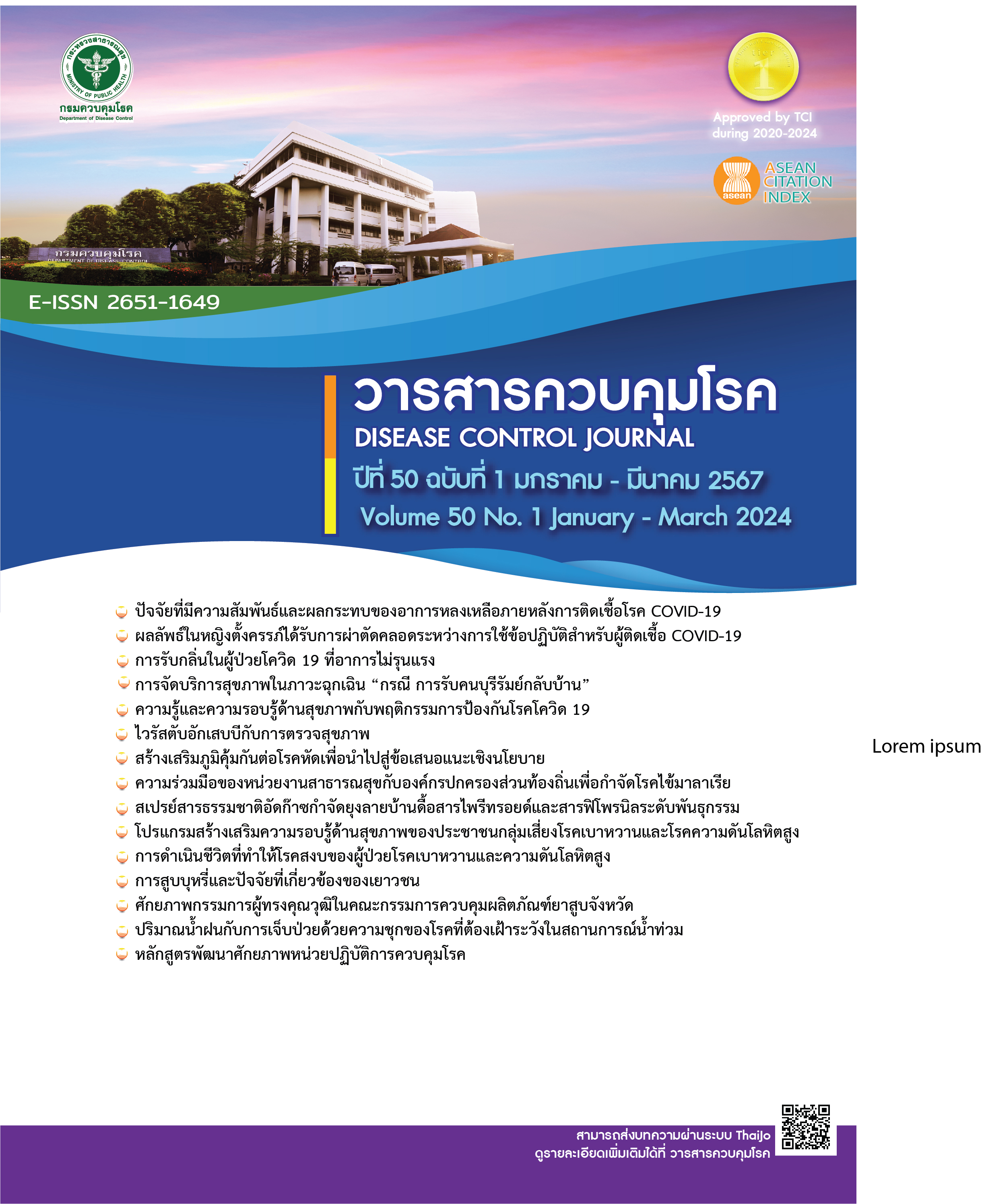Proper lifestyle habits leading to remission phase of diabetes and hypertension patients, Pak Thong Chai district, Nakhon Ratchasima province
DOI:
https://doi.org/10.14456/dcj.2024.11Keywords:
lifestyle, remission phase, diabetes, hypertensionAbstract
Noncommunicable diseases (NCDs) are caused by improper and unhealthy lifestyle. This qualitative case-study focused on proper lifestyle habits which led to a remission phase of diabetes and hypertension patients. Data were collected by in-depth interview, focus group discussion and both direct and indirect observation of twenty-seven purposively selected cases, and analyzed using content analysis. The results revealed that proper lifestyle habits contributing to disease remission were achieved through: 1) The operational model has had five main features including 1.1) using of the Four-Es Principle (Emotion, Eating, Exercise, and Elimination) and epidemiological principle to manage NCDs, 1.2) actions based on community participation, 1.3) developing health training program aimed at skill development, 1.4) accessibility to health services, and 1.5) implementation of participatory approach; 2) The combination of two lifestyle patterns leading to disease remission including 2.1) “daily practices” on, relaxation, adequate dietary intake, whole-body movement exercise for at least 30 min or until sweating and detoxification with sufficient water intake; and 2.2) “weekly practices” on health checkups (blood sugar level and blood pressure measurements), traditional Chinese medicine hand massage, foot massage using coconut shell, breathing using SKT method, and detoxification using “Gua Sha” therapy. In summary, the operational model development to encourage proper lifestyle habits leading to disease remission among diabetes and hypertension patients required both art and science involving an integration of knowledge and skills, activities design, effective practice guidelines based on the community context and requires cooperation among multidisciplinary teams.
Downloads
References
World Health Organization. Noncommunicable disease [Internet]. [cited 2023 Oct 20]. Available from: https://www.who.int/news-room/fact-sheets/detail/noncommunicable-diseases
National Institute for Emergency Medicine. Global and Thai perspectives on emergency health and medical situations: Assessing current scenarios and emerging trends [Internet]. [cited 2023 Mar 5]. Available from: https://www.niems.go.th/1/UploadAttachFile/2022/EBook/414764_20220208161448.pdf (in Thai)
National Institute for Emergency Medicine. A study on the emergency medical situation and the improvement of quality of emergency care practices for stroke patients [Internet]. 2022. [cited 2023 Mar 5]. Available from: https://www.niems.go.th/1/UploadAttachFile/2022/EBook/415818_20220624102116.pdf (in Thai)
Nakhon Ratchasima Provincial Public Health Office. Non-Communicable Disease performance report. Nakhon Ratchasima province: Nakhon Ratchasima Provincial Public Health Office; 2021. (in Thai)
Singsalasang A, Satayavongthip B, Salawongluk T. Potential development among monks on disease protection and complication of chronic disease, Nong Phluang sub-district, Jakkarat district, Nakhon Ratchasima province. Christian University Journal. 2022;28(1):88-100. (in Thai)
Faculty of Public Health, Nakhon Ratchasima Rajabhat University. 8 parallel drug training courses Kill NCDs (Enhance the management of Chronic Non-Communicable Diseases with the four elements principles). Nakhon Ratchasima province: Faculty of Public Health, Nakhon Ratchasima Rajabhat University; 2019. (in Thai)
Inthakanok S, Satayavongthip B, Singsalasang A, Nguanjairak R, Seesan C, Salawongluk T. Development of village health volunteer’s capacity on Chronic Non-Communicable Diseases management: A study of the responsible area of Nam Sub Health Promoting Hospital, Pak Thong Chai district, Nakhon Ratchasima province. The Office of Disease Prevention and Control 9th Nakhon Ratchasima Journal. 2021;27(1):56-67. (in Thai)
Singsalasang A, Salawongluk T, Satayavongthip B, Nguanjairak R, Phungphet S. Quality of life among the elderly who participated in activities in the elderly school. Proceeding of the 11th National academic conference and presentation of local research (Connecting Local Research to International Perspectives); 2019 Aug 6-7; Nakhon Ratchasima, Thailand: Nakhon Ratchasima Rajabhat University; 2019. (in Thai)
Soisong S, Rueankon A, Apichantramethakul K, Nunta N, Sukkaseam J. Perceived self-care behavior among patients with type 2 diabetes mellitus with poor glycemic control. Journal of Phrapokklao Nursing College. 2017;28(2):93-103. (in Thai)
Thongtum T, Satayavongthip B, Salawongluk T. New non-communicable disease management four elements. Nakhon Ratchasima province: Faculty of Public Health, Nakhon Ratchasima Rajabhat University; 2019. (in Thai)
Sattayasomboon S, Sattayasomboon Y. Hypertension and type 2 diabetes mellitus patients: A systematic review on the chronic care model (CCM) and self-management support (SMS). The Southern College Network Journal of Nursing and Public Health. 2020;7(2):232-43. (in Thai)
Nakhon Ratchasima Rajabhat University and Pak Thong Chai Hospital. Summarize the performance of chronic non-communicable disease management with 4 element principles. Nakhon Ratchasima province: Nakhon Ratchasima Rajabhat University; 2021. (in Thai)
Miles MB, Huberman AM. Qualitative data analysis: An expanded sourcebook. 2nd ed. London: SAGE Publications; 1994.
Phungphet S. The development of English teaching model relevant to learning style of Prathomsueksa Students [dissertation]. Nakhon Ratchasima: Vongchavalitkul University; 2010. (in Thai)
Taba H. Curriculum development theory and practice. New York: Harcourt College Pub; 1962.
Kemmis S, McTaggart R, Nixon R. The action research planner. 3rd ed. Geelong: Deakin University press; 1992.
Rogers RW. Cognitive and physiological processes in fear appeals and attitude change: A revised theory of protection motivation. In: Cacioppo JT, Petty R, editors. Social Psychophysiology. 1st ed. New York: Guilford press; 1983.
Kanfer FH, Goldstein AP. Helping People Change: A textbook of methods. 3rd ed. New York: Pergamon Press; 1991.
Kessin J. Self-management, knowledge, quality of life in new case with type II diabetes mellitus, pre-post type II diabetes patients selfmanagement program in Urban Areas, Uthaithani province. Journal of Nursing. 2013;40(1):84-103. (in Thai)
Salawongluk T, Singsalasang A, Satayavongthip B. The model for student potential developing in home health care to relieve suffering, Nong Phluang sub-district, Chakkarat district, Nakhon Ratchasima province. Proceeding of the 19th National academic conference and presentation of local research (education for sustainable community development); 2019 May 10; Chiang Mai, Thailand: Chiang Mai Rajabhat University; 2019. (in Thai)
Bandura A. Self-efficacy: The exercise of control. New York: W.H. Freeman and Company; 1997.
Downloads
Published
How to Cite
Issue
Section
License
Copyright (c) 2024 Disease Control Journal

This work is licensed under a Creative Commons Attribution-NonCommercial-NoDerivatives 4.0 International License.
Articles published in the Disease Control Journal are considered as academic work, research or analysis of the personal opinion of the authors, not the opinion of the Thailand Department of Disease Control or editorial team. The authors must be responsible for their articles.






